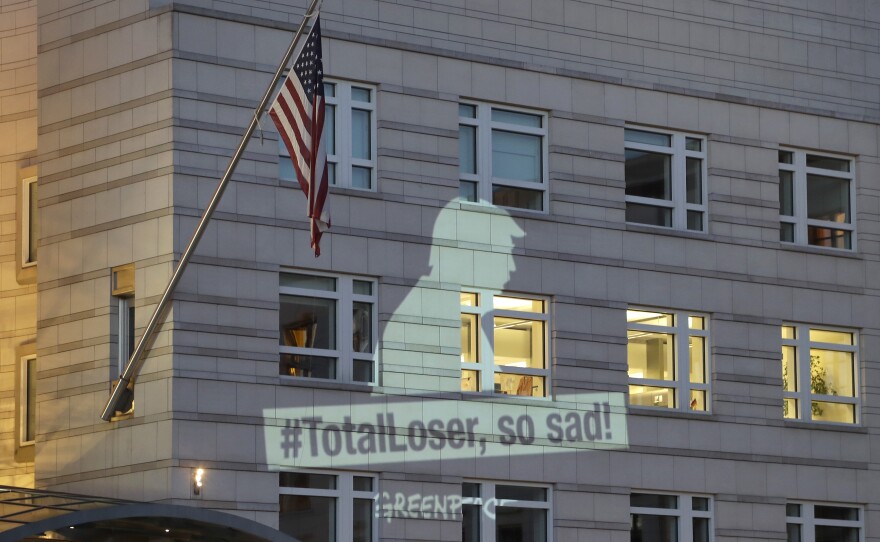Less than 12 hours after President Donald Trump announced that the he would exit the Paris climate accord, the U.S. embassy in Berlin, Germany, was lit up with a projection of Trump’s face. It said “#TotalLoser, so sad!” Police soon arrested Greenpeace protesters, who put up the image. That’s one example of the strong reaction in Europe to Trump’s decision.
WSHU’s Cassandra Basler is currently in Berlin on a Pulitzer Traveling Fellowship. She spoke to All Things Considered Host Bill Buchner about Europe’s reaction to Trump’s announcement. Below is a transcript of their conversation.
Hi, Cassandra.
Hi, Bill.
You’ve been speaking to people in Berlin. What have you noticed?
There have been a few acts of protest, like the one you just described. Representatives from Germany’s Green Party also picketed with signs that said “Trump against the planet.” You probably heard about the French president’s viral video where he said “Make the planet great again.” There have been a lot of jokes, but officially, the German, French and Italian governments say they regret that Trump wants to renegotiate the climate deal. European Union countries met with China on Friday to discuss how to keep their commitments. On the ground, everyday Germans I spoke with seem disappointed in the U.S. for backing out.
Let’s hear from some of them about what they think. Berndt Hacken is a retiree from Berlin.
Es ist ein Katastroph! Nicht nur für die Anderen, sondern auch für Amerika.
Hacken says Trump’s announcement is a catastrophe – not just for the countries remaining in the deal, but also for the U.S. He thinks it will isolate the U.S. and hold back progress towards renewable energy.
Trump did say one of the reasons he thinks the Paris accord is a bad deal for the U.S. is that pushing green energy won’t make the U.S. attractive for businesses and it won’t bring back America’s coal industry. Let’s hear from Berliner Martin Ramm about that.
I think Trump is trying to push for something that is just not possible anymore. I don’t think there will be more jobs in the coal mining because we pulled out of this agreement. I just don’t think this will happen.
Ramm is not the only one who thinks coal jobs won’t return. I also spoke to Dr. Susanne Dröge. She studies trade policy and climate at the German Institute for International and Security Affairs. She says the market demands more natural gas and renewable energy as the rest of the world looks to meet Paris accord emissions goals.
And with China meeting with the European Union, what does Dröge think that says about the U.S.’s place in international affairs?
Dröge says Trump’s move could actually strengthen the European Union – something that the world had been concerned about as the U.K. plans its exit.
Now that U.S. dropped out of this Paris agreement, that could bring forward this cooperation that was so tricky before.
Are there people who don’t want Europe or Germany to take the lead on this international climate policy?
Dröge says there are nationalists who may be against the climate accord because they just don’t want their country getting involved in international politics. Also, countries like Poland produce coal, so some people living there are concerned about their mining industry in the same way that Trump supporters in coal country want to keep their jobs.
What does Dröge think is next for the United States and global climate policy?
She seems optimistic about the next four years, actually. She says the E.U. will continue to be friends with the U.S., but it might even strengthen international relationships in the private sector.
I expect that ties with the U.S., not probably at the federal level, but with U.S. states and business and NGOs, so civil society, will become closer even.
She was right. Here in the U.S. the mayors of cities like New York and Boston, and Governors Andrew Cuomo in New York and Dannel Malloy in Connecticut are stepping up. They say they will support goals of the Paris Agreement, even if the Trump administration does not.
Yes, and Dröge sort of thinks everybody should just carry on like Trump’s announcement didn’t happen.
What to do with this administration, is to ignore what they are trying to block as part of the Paris Agreement because legally the U.S. is still part of the agreement for four years.
So Dröge thinks states should continue with climate goals, but did she have anything to say about the impact the climate deal would have here in the U.S.?
Dröge did say that she thinks this would make climate policy a big deal in the next U.S. presidential election, but she hopes it won’t become a polarized issue.
We’ll have to wait and see. Thank you, Cassandra.
Thanks, Bill.





